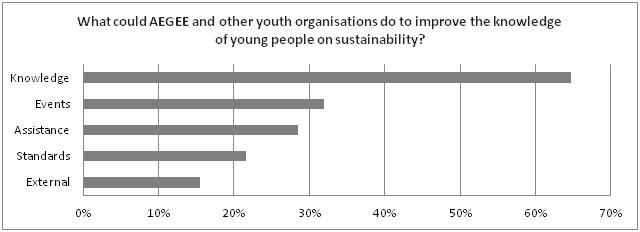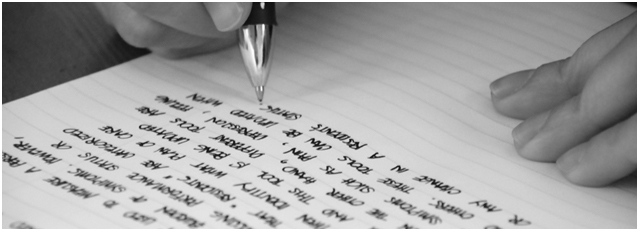What do AEGEE members understand when talking about sustainability? Where did they learn about this? And how would they like AEGEE to be involved with this topic? Finding out the answers to these questions was the aim of the survey on sustainability which was completed by almost 120 people from over 60 locals all around the network. Both multiple choice and qualitative answers were analysed and quantified, and will serve as input for AEGEE’s position paper on sustainability.
Sustainability is…
… a buzzword/often misunderstood/a way of thinking/ a clear path for action/ all of the above. One thing is clear: ask 120 people about their understanding of sustainability and you will get 120 different answers. This can however only enrich the debate, as a concept as complex as sustainability can only be understood and operationalised by looking at it from multiple angles at the same time. So — at risk of generalisation — what do AEGEE members think of sustainability?
Sustainability is the way of living, creating public policy and economic growth that takes into account environmental issues and will help to preserve natural resources for future generations.”
This explanation by a respondent from AEGEE-Poznań perhaps succeeds the best at capturing the wide range of ideas and definitions collected through the survey. For when analysed the answers fell broadly into a number of categories, of which the most important keywords are (in order of frequency): Future, Resources, Green, 3 elements, and Balance.
One in two respondents focus on long-term thinking and planning, preserving our planet and quality of life for future generations. This requires a different approach at resource usage and the introduction of closed-loop production and consumption systems. While many respondents mentioned the classical 3 components of sustainability — economy, society, and environment — and the balance between them, over 20% however, still see sustainability in a predominantly green light.
Education for sustainability
So even though 91% of respondents have at least some notions of sustainability, there is still some room for improvement. How much do AEGEE members — and youth in general — know about sustainability, and how much of this did they learn at school? It is true that the basics are being discussed in primary and secondary school — think water cycle and geography field trips —, but this “decreases as you pass to the next level of education, as the education becomes more specific and ‘serious’”, says a member of AEGEE-Valladolid.
Almost three in four respondents feel there is not enough attention for sustainability within formal education and 48% even estimate that sustainability-wise their time at school was a waste of time, with another third only learning a little about it.
On the other hand less than 25% believe they don’t know enough about the topic to do anything themselves. So where do people get their knowledge from then? This is where non-formal education (NFE) comes in, says Bogdan from AEGEE-Bucureşti: “I only found out about this from my AEGEE local.”
For one in three respondents, NFE is also a more suitable method for teaching sustainability than formal education. “Non-formal education is better in showing people ways to live more sustainable instead of simply telling them what to do”, says Wieke of AEGEE-Leuven, and Nolwen (AEGEE-Toulouse) continues: “Sustainability is about reforming our societies deeply and fundamentally, it therefore requires non-formal education, out of books, it requires to learn by doing, by discussing.”
Time for action
While playing a big role in teaching young people about sustainability, NGOs (28%) score significantly lower than e.g. national government (33%) when respondents are being asked to rank 6 stakeholders in order of importance to take initiative in making life more sustainable (weighted average 30%). It is therefore crucial to cooperate with all stakeholders in pursuing sustainability, including national and local government, business, youth and other NGOs, citizens’ initiatives, and individuals.
What role do respondents then see for organisations such as AEGEE?
Like many things, sustainability starts at home. For Guillermo Garcia Tabares of AEGEE-Barcelona, we should “first of all establish some obligatory criteria for all events. Secondly, create best practices which are easy to follow.” Only then, he says, should we start working on bigger projects. Again analysing the answers, we can see that respondents suggest a number of possible approaches.
More than one in five support Guillermo’s proposal for internal sustainability standards, while slightly more people would like to see Environmental Working Group and others to provide assistance to members and organisers to become more sustainable. Most respondents favour the raising of awareness and spreading of knowledge through workshops, but as this was not a multiple choice question, this serves mostly as a first step towards a more active engagement. Finally, remarkable are also the 15% who suggest raising our voice externally, by lobbying institutions for more sustainability or partnering with other youth organisations.
And now?
After defining the topic and conducting a survey to gather the first input, the next step is to launch an online consultation on the topic of sustainability — more in particular education for sustainability. This process will be informed by a lay of the land in Europe, and will define the basis for future lobbying for more attention for sustainability in both formal and non-formal education.
On sustainable entrepreneurship, the second subtopic proposed at Agora Budapest, not sufficient knowledge and outspoken opinions seem to be available within AEGEE at the moment. While I will continue to research the topic and share useful opportunities, it might be too soon for AEGEE to take a position on this. Rather, more time and efforts should first be invested in raising people’s understanding of, and experience with entrepreneurship as such, e.g. through successful projects such as the European School on Entrepreneurship or collaborations with Startup Pirates and other specialised initiatives.
Written by Mathieu Soete, Policy Officer on Sustainability


